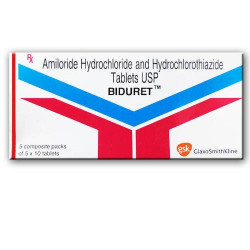Amiloride (hydrochlorothiazide) Coupons and Discounts & Cost
Amiloride Hydrochloride is a potassium-sparing diuretic. One way to save money on the Amiloride (hydrochlorothiazide) retail cost regardless of income and insurance status is to use Amiloride (hydrochlorothiazide) coupons or discount cards from RXCoupons. Use our Amiloride (hydrochlorothiazide) coupons at your online pharmacy and receive up to 75% off the sale price each time you refill your prescription.
What is Amiloride (hydrochlorothiazide)
Amiloride Hydrochloride is a potassium-sparing diuretic. The drug enhances the intensity of excretion of sodium and chloride ions, as well as reduces the excretion of potassium ions from the human body. In addition, the drug has less pronounced effect than other thiazide diuretics.
Amiloride (hydrochlorothiazide) should be used only in combination with other diuretics in order to avoid excessive excretion of potassium and magnesium.
Amiloride (hydrochlorothiazide) indications for use
The drug is used to treat edematous syndrome of different genesis (chronic heart failure, nephrotic syndrome, liver cirrhosis). It is also used as a diuretic in arterial hypertension and heart failure. The drug should be taken in combination with other diuretics to reduce the risk of hypokalemia (low potassium level in the blood).
Amiloride (hydrochlorothiazide) dosing and administration
Amiloride (hydrochlorothiazide) can be administered through the mouth after eating. It is excreted unchanged in urine. Therefore, it is not indicated in patients with renal insufficiency. Amiloride diuretic effect may last for up to 24 hours.
The initial dose of the drug in edematous syndrome is determined by the severity of violations of water-electrolyte metabolism. The usual adult dosage is 1-4 tablets a day (1-2 tablets in 1-3 days as maintenance therapy).
The initial dose in hypertension is 1 tablet every day (half tablet every other day after reaching the desired result).
Patients can feel the effect within two hours after drug administration.
In addition, the drug is well absorbed by the kidneys and liver. However, the drug should not be used if the patient has problems with kidneys or liver, since after accumulation Amiloride can also have negative impacts.
Amiloride (hydrochlorothiazide) interaction with other drugs
ACE inhibitors increase the risk of hyperkalemia (due to potassium retention).
Thiazides and other diuretics may cause hypokalemia.
Potassium agents, other potassium-sparing diuretics, food supplements containing potassium may cause severe hyperkalemia.
Amoxicillin may slow the absorption of Amiloride (hydrochlorothiazide) from the digestive tract.
Hyponatremia can develop if Amiloride (hydrochlorothiazide) is used with hydrochlorothiazide, trimethoprim.
Amiloride (hydrochlorothiazide) contraindications
Amiloride (hydrochlorothiazide) is contraindicated in the following conditions:
- Hyperkalemia;
- Kidney disorders;
- Hepatic coma;
- Hypersensitivity to Amiloride.
The drug is not recommended for pregnant and breastfeeding women.
Amiloride (hydrochlorothiazide) side effects
The drug may cause the following side effects: nausea, vomiting, skin rash, headache. However, these side effects disappear immediately after termination of Amiloride (hydrochlorothiazide) therapy. In case of serious disorders patients are advised to lower the dose of Amiloride (hydrochlorothiazide).
Amiloride may also increase the level of potassium in the body. This may lead to weakness in the muscles, abdominal distension and diarrhea. Patients with diabetes have an increased susceptibility to the potassium-sparing effect of Amiloride.
Amiloride (hydrochlorothiazide) special instructions
Amiloride (hydrochlorothiazide) is usually administered in combination with other diuretic drugs that lead to a reduction of potassium in the blood.
Amiloride should be used with great care in patients with impaired renal function. Amiloride therapy is allowed only after consultation with a specialist. It is necessary to listen to all recommendations given by your doctor.

